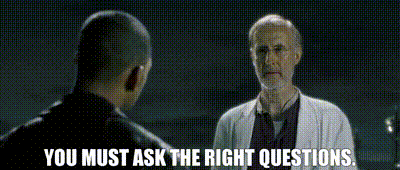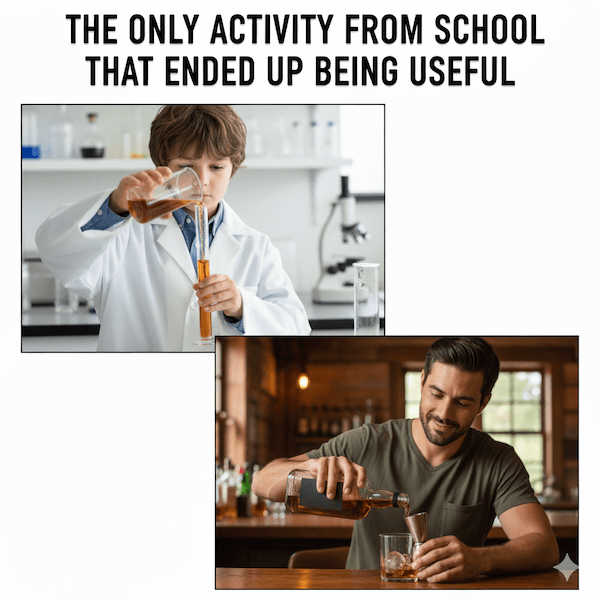We have some massive misconceptions about what drives career success.
Most of them? They come from what we learned in school.
And here's the thing:
These "lessons" aren't just unhelpful - they're actively holding us back.
(Want proof? When psychologist Lewis Terman tracked 1,400 "genius" students' careers, most ended up pretty average. Meanwhile, two students he rejected for "low IQs" went on to win Nobel prizes.)
Because the fact of the matter is…
School success doesn’t equal career success.

So today, I want to share 6 career-killing lessons we learned in school that we should unlearn if we want to have stellar careers.
Number one:
❌ “Mistakes, bad!”
You put a bunch of wrong answers in a maths test, and it gets handed back to you with an, “F”.
What school tells us:
“Mistakes are bad.”
The reality:
Mistakes are the only way you learn (and reach success)! Often, mistakes aren’t only not to be avoided, but must be actively sought to make progress.
Part of why we get so crushed when we mess up at work? It's because "failure = bad" has been drilled into us since we were kids.
Here's what you need to internalize instead: Every failure is a data point. Every setback is growth. The faster you fail, the faster you learn.

And on a related note…
😵 Struggle is actually GOOD
Here's something wild: Often, it's the "perfect" students who struggle most in their careers.
Why?
Because they've often never failed. Never faced rejection. Never had to pick themselves up after a real setback.
They've mastered getting A's. But they've never learned how to bounce back from F's. And that’s probably the #1 career skill.
Even NVIDIA's CEO tells Stanford students he wishes them "pain and suffering" - because that's what builds the resilience you need in the real world.

The takeaway? Struggling = building the resilience that school never taught you.
🤓 Mr. Know-it-all ain’t Mr. Win-it-all
When Henry Ford was called "ignorant" in a newspaper, he sued. In court, lawyers tried proving it by firing trivia questions at him.
Ford's response? "If I need to know something, I press a button and get an expert to tell me. Why clutter my mind with things that don't matter to my business?"
See, school taught us expertise means knowing all the answers.
But in your career? Expertise is knowing which questions to ask, and who to ask them to.
Because career success isn’t a general knowledge quiz. Far more important are vision, original thinking and the ability to ask great questions.
The key takeaway for you: Get better at asking the right questions. This is also probably the #1 skill to get better at with AI too - AI (like a ChatGPT) is only as good as the prompts or questions you give it.

↔ The opposite of a good idea might be a good idea
This might sound obvious, but it's something even senior managers get wrong:
There is no single "right" answer.
In fact, sometimes complete opposites can work brilliantly:
Some leaders succeed by being hands-on with their team. Others win by stepping back completely.
Some products thrive on premium pricing. Others dominate by being the cheapest option.
A fun example:
Take Avis, the car rental company. Every company claims to be #1 in their ads. But Avis? They took the opposite approach: "We're #2. We try harder."

It’s one of the best performing marketing campaigns of that era.
The key takeaway: As you progress in your career, remember this - “the opposite of a good idea can also be a good idea” (shout out to legendary marketing exec Rory Sutherland for that quote). There's rarely one "right" way (and don’t listen to people who say their way is the only way).
⏳ Don’t play the ‘short game’
In school, everything's short-term. You study for an exam, take it, get your grade in a week. Do a 6-month coursework, get your results at year-end.
But in life?
The most valuable work often takes years to bear fruit - with little feedback along the way.
Like when:
- A mentor you've known for years puts your name forward for a leadership role
- An old client brings you in to lead a high-profile project
- Your reputation lands you a coveted speaking slot at an industry conference
- Someone you helped five years ago becomes CEO and remembers your kindness
School trains you to expect quick results. But the biggest career wins? They come from playing the long game.
The key takeaway: Stop expecting quick wins like school trained you for. The best career moves are often invisible for years before they pay off.

📋 "Follow the rules!"
In school, you win by following instructions. Remember that kid in class who always colored inside the lines? Who never deviated from the textbook answer? They probably got straight A's.
But in your career? The biggest breakthroughs often come from questioning "how things are done."
Maybe it's finding a better way to run team meetings. Or discovering a more efficient approach to project planning. Or developing a new way to handle client relationships.
The point isn't to break rules for the sake of it. It's about recognizing when the old way isn't the best way.
The key takeaway: Sometimes the best solution comes from ignoring "how things are done" and asking "how could things be done?"



